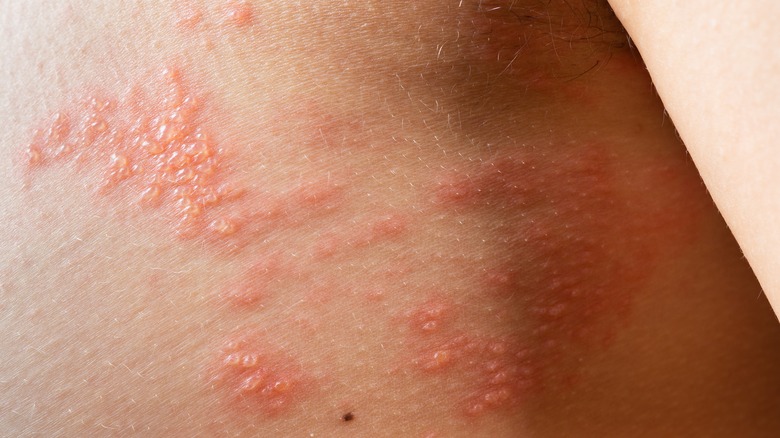Can You Get Shingles More Than Once? Exploring Recurrence Risks
Shingles, a painful viral infection caused by the varicella-zoster virus (the same virus that causes chickenpox), is a medical condition that can leave individuals grappling not only with its initial discomfort but also with lingering questions. Among these questions, a prominent one often arises: Can you get shingles more than once?
Understanding Shingles
Before we delve into the possibility of shingles striking more than once, it’s crucial to grasp the fundamentals of this viral infection. Shingles, also known as herpes zoster, typically manifests as a painful rash with blisters. It occurs when the varicella-zoster virus, which remains dormant in the body after a previous episode of chickenpox, reactivates.

The initial infection presents with various symptoms, which may include:
Painful Rash:
The hallmark of shingles is a painful rash that typically appears on one side of the body. This rash evolves into fluid-filled blisters, which then crust over as they heal.
Burning Sensation:
Before the rash becomes visible, many individuals report a burning or tingling sensation in the affected area.
Flu-Like Symptoms:
Some people may experience flu-like symptoms such as fever, chills, fatigue, and headache.
Shingles Recurrence: Is It Possible?
Shingles can be an unwelcome visitor more than once in a person’s life. The recurrence of shingles, while less common than the initial occurrence, is indeed possible. To answer the question definitively—yes, you can get shingles more than once.
However, the likelihood of recurrence and the factors influencing it can vary. Let’s break it down:
Frequency:
Recurrence of shingles is relatively rare. Most individuals who experience shingles do not have a second episode.
Weakened Immunity:
People with weakened immune systems, such as those with certain medical conditions or undergoing immunosuppressive treatments, are at a higher risk of shingles recurrence.
Factors Influencing Shingles Recurrence
Shingles recurrence is not entirely random; several factors come into play, increasing the risk of experiencing a second episode. Understanding these factors can help individuals assess their susceptibility:
Weakened Immune System:
A compromised immune system is a significant contributor to shingles recurrence. Medical conditions that weaken immunity, such as HIV/AIDS or cancer, and immunosuppressive treatments can make individuals more vulnerable.
Advanced Age:
Age is a factor to consider. The risk of shingles recurrence tends to be higher among older adults, especially those over the age of 50. The body’s ability to suppress the reactivation of the varicella-zoster virus may decrease with age.
Symptoms of Shingles Recurrence
Symptoms of shingles recurrence are generally similar to those of the initial outbreak. Common signs include:
Painful Rash:
A rash that typically appears on one side of the body or face.
Burning or Tingling Sensation:
Some individuals experience a burning or tingling sensation before the rash becomes visible.
Flu-Like Symptoms:
These may include fever, chills, fatigue, and headache.
Itching:
The rash can be intensely itchy, adding to the discomfort.
Preventing Shingles Recurrence
While shingles recurrence is possible, there are steps you can take to reduce the risk and minimize its impact. Preventive measures include:
Shingles Vaccine:
Consider getting the shingles vaccine (Shingrix) if you’re eligible. It is highly effective at reducing the risk of shingles and its recurrence.
Maintaining a Healthy Lifestyle:
A balanced diet, regular exercise, stress management, and adequate sleep can bolster your immune system.
Managing Underlying Conditions:
If you have medical conditions that weaken your immune system, work closely with your healthcare provider to manage them effectively.
Medical Treatment for Recurrent Shingles
If you experience recurrent shingles, seeking medical advice is crucial for effective management. Treatment options may include:
Antiviral Medications:
Antiviral drugs like acyclovir, valacyclovir, or famciclovir can help reduce the severity and duration of the outbreak. They work best when started early.
Pain Management:
Over-the-counter or prescription pain relievers can help alleviate the pain associated with shingles recurrence.
Topical Treatments:
Creams or ointments containing capsaicin or lidocaine may provide relief from itching and discomfort.
Frequently Asked Questions (FAQs) about Shingles Recurrence
1. Q: Can shingles come back after you’ve had it once?
A: Yes, shingles can recur, although it is relatively rare. Recurrence is more common in individuals with weakened immune systems.
2. Q: What are the risk factors for shingles recurrence?
A: Risk factors include age, weakened immune system, stress, and underlying medical conditions.
3. Q: Is there a vaccine to prevent shingles recurrence?
A: Yes, the Shingrix vaccine is highly effective at reducing the risk of shingles recurrence. It’s recommended for individuals aged 50 and older.
4. Q: How can I recognize the symptoms of shingles recurrence?
A: Symptoms are similar to the initial outbreak and may include a painful rash, burning or tingling sensation, and flu-like symptoms.
5. Q: What should I do if I suspect shingles recurrence?
A: Contact your healthcare provider promptly. Early intervention can help manage the condition effectively.
6. Q: Can stress trigger shingles recurrence?
A: Stress can weaken the immune system, potentially increasing the risk of shingles recurrence.
7. Q: Are there complications associated with recurrent shingles?
A: Yes, postherpetic neuralgia (PHN) is a common complication characterized by persistent pain in the affected area.
8. Q: Can I prevent shingles recurrence naturally?
A: Maintaining a healthy lifestyle, managing stress, and considering vaccination are natural ways to reduce the risk.
9. Q: What treatments are available for recurrent shingles?
A: Treatment may include antiviral medications, pain management, and topical treatments. Consult your healthcare provider for personalized advice.
10. Q: Is shingles recurrence more common in older adults?
A: Yes, the risk of shingles recurrence tends to be higher among older adults, especially those over the age of 50.
Conclusion:
In conclusion, the question of whether you can get shingles more than once has been answered—yes, it is possible. However, shingles recurrence is relatively rare, and preventive measures, including vaccination, can significantly reduce the risk. Understanding the factors that influence recurrence, recognizing the symptoms, seeking timely medical treatment, and considering vaccination are crucial steps in managing shingles effectively.




